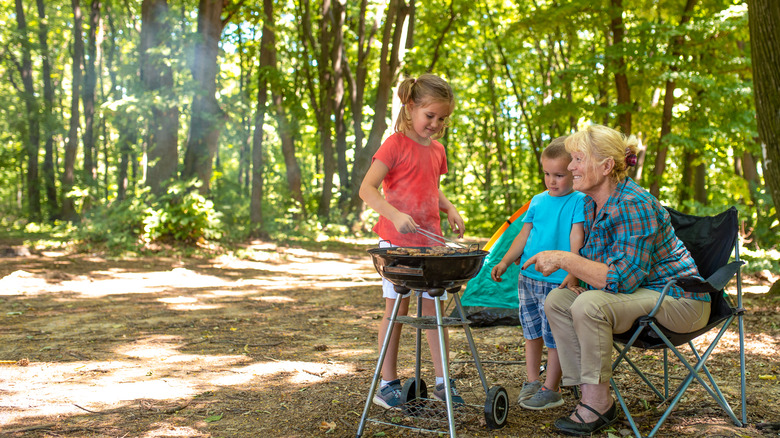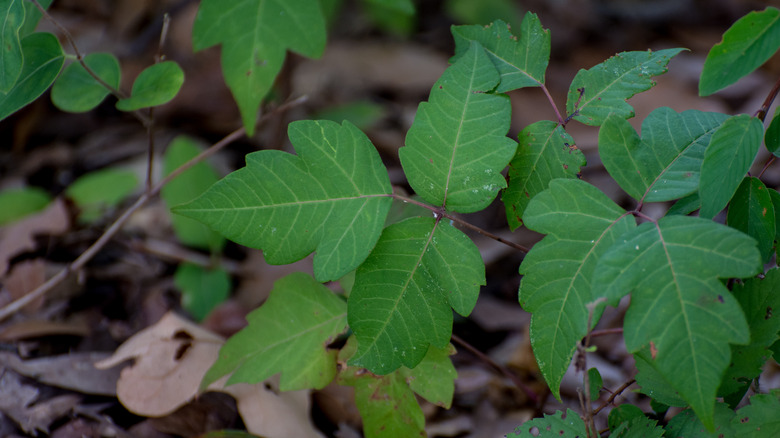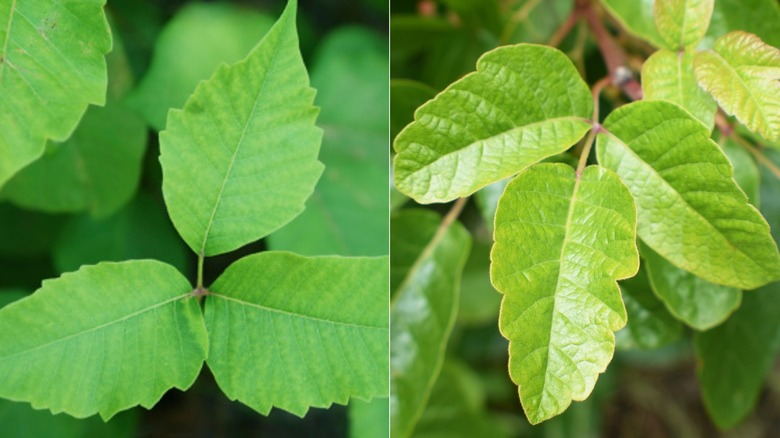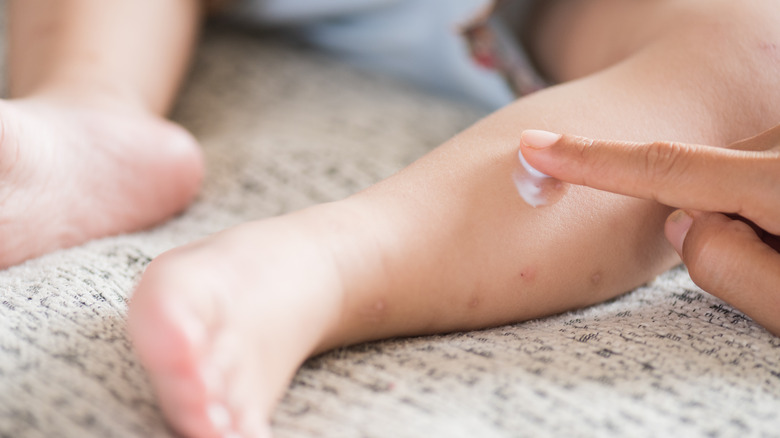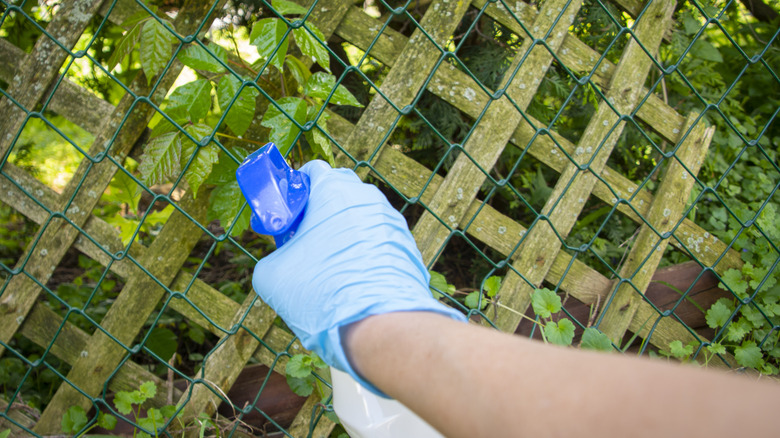The Major Barbecue Mistake That Will Make You Itch
You're planning to have a fun day with your family at a local park. Everything has been planned perfectly — from the meal to the activities. You gather up your crew to hike in the woods, planning to find some wood to get the fire going. But little do you know that your campfire will be the start of an itchy nightmare for your family.
Poisonous plants like poison ivy, sumac, and oak can grow in just about any wooded area. Without the proper precautions, your family could be in a poisonous plant nightmare, especially if you're scavenging wood. The oils on the plants aren't just dangerous on the leaves. They can easily make their way onto wood and other forest surfaces. Once it's in the air, it can cause chaos for your fun family day — especially since you only need to be exposed to a tiny amount of oil for the itch to start (think less than a grain of salt, according to Cleveland Clinic).
You can keep your barbeque exciting (and not itchy) by learning what poisonous plants look like and how the oil spreads — and how your family can prevent the itch altogether.
How the itch from poisonous plants spreads
Poisonous plants can be hard to avoid because they grow in wooded areas all over the U.S. But despite the myths about poison ivy and its friends, they aren't contagious. The itch comes from the oil on the leaves called urushiol. Now urushiol is tricky because it can stick to almost anything. So if your pant leg or your twig brushes against the leaves and touches your skin, a reaction will ensue.
But urushiol has a long shelf life. It can stay active on any surface for anywhere from one to five years, according to Illinois Wesleyan University. For example, imagine that the park service mows over some poisonous plants, spreading the oil on the surrounding woods. Some time later, you might pick up an affected branch for your barbeque. Once it burns, the oil enters the air exposing your face, eyes, and lungs.
Urushiol also takes time to cause a reaction, so you might not develop a response the first (or even the second) time you touch it. Still, eventually, most people will develop an itchy rash after contact with the oil. It just might take several days to materialize. Knowing what you're looking for can help you to take precautions.
Recognize itchy plants that might ruin your barbeque
It's not always possible to avoid everything a poisonous plant has touched, but you can stay vigilant during your barbeque by knowing what common poisonous plants look like. This is especially true since Jessica Krant, M.D. of SUNY Downstate Medical Center, noted to Consumer Reports that "Poison ivy rashes have been getting more severe each season due to global warming and longer growth seasons with stronger urushiol production." Keeping away from it is going to be your first line of defense.
You might have heard the saying, "Leaves of three, leave them be." This is true of poison ivy and poison oak. Poison ivy grows in three-leaf clusters on a vine low to the ground, but can crawl up fences and trees. WebMD also noted they have a smooth surface with a leaf on one side and one in the middle. Poison oak has a similar cluster pattern of leaves, but is hairy with rounded edges. They still grow close to the ground, giving them easy access to bare legs.
Poison sumac plays by its own rules. You can identify poison sumac by a leaf cluster of seven or more — however, it still has a lone leaf at the end. It's also smooth and round with a notched tip, making it harder to distinguish than its itchy cousins. Learning the symptoms of exposure can help you get treatment going ASAP. This is especially for sensitive areas like the eyes and face.
Ways to relieve the itch -- and when to see a specialist
Urushiol can sneak onto your wood, tools, clothes, and even blankets at your barbeque if someone accidentally gets near it. While these plants might look different, their rash is pretty similar. It forms small itchy blisters clustered together anywhere the oil touches the skin. Acting fast is the key to avoiding an all-out itchy war on your skin.
The American Academy of Dermatology Association (AADA) recommends immediately rinsing your skin with soap and water to remove the oil so you don't spread it to other areas or a family member. Washing your clothing and any other surfaces that the oil might have touched is also pivotal. Alcohol is also helpful for removing oil from surfaces. Since it can last so long, it could potentially lead to an additional breakout if not removed.
At-home remedies to remove a mild itch, like soaking in a cool bath or shower, can be helpful. The Almanac also recommends adding baking soda or salt to the tub for soothing irritation. Over-the-counter antihistamine pills and creams, like calamine, are some of the best ways to get rid of poison ivy itch. However, you'll want to see your healthcare specialist for large rashes, facial rashes, severe swelling, and fever. These symptoms indicate that an infection or a more severe allergic reaction might have formed. The best way to ensure your barbeque comes off without an itch is to try a few proven prevention methods.
Prevent an itchy situation at your next barbeque
Poisonous plants have a way of making your hike, family outing, or barbeque at the beach turn into a disaster. To keep your family itch-free in a wooded area with poisonous plants, you can apply an ivy blocker to your skin, stated the AAD. This is particularly beneficial for days it will be hard to cover up, like a barbeque at the beach.
You might also want to keep a bit of rubbing alcohol and dish soap on hand. Use this to treat any skin that might have been exposed to poisonous plants to quickly wipe the area of any oils. Use charcoal or gas barbeque to make your food to prevent contaminated timber, and consider buying any firewood from a camp store or other area. Wear long sleeves, pants, and gloves if you choose to gather wood. Avoid gathering wood around areas with suspicious plants. It's also important to wash your pets to ensure they haven't gotten into anything itchy.
Barbequing is a fun summertime activity that many families look forward to. But it's essential to be aware of some of the itchy dangers lurking around — and be ready to act fast to avoid an itchy situation.

